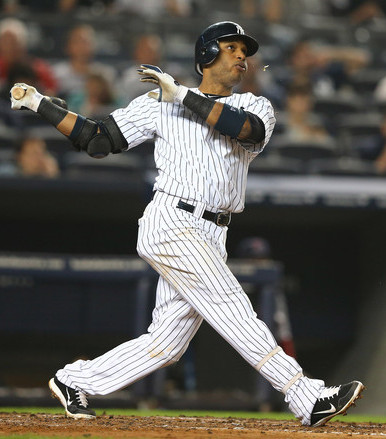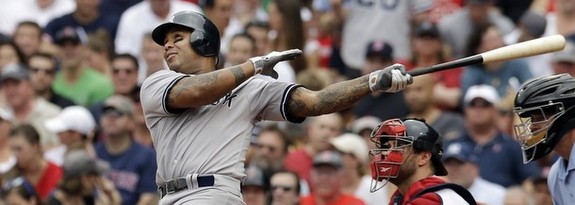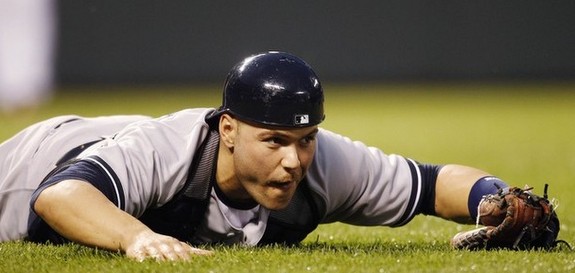Got five questions this week but two of them got short answers, so it’s more like 4.5 questions this week. Please use the Submit A Tip box in the sidebar to send up mailbag questions, links, or anything else.

Rich asks: I have an irrational love for David Phelps. To me he’s been both durable and productive. From what I see, it seems like a lot of the damage done against him in starts is during the first inning (perhaps rookie jitters?). Any way you can find out his line in starts less that dreaded 1st? I really think he will go on to do great things for the team.
This question was sent in a few days ago, and sure enough Phelps went on to allow two runs in the first inning of Tuesday’s start before settling down and firing off zeroes the rest of the way. Here are his inning by inning splits…
| Split | G | IP | PA | R | H | 2B | 3B | HR | BB | SO | HBP | tOPS+ | sOPS+ | ||||||
|---|---|---|---|---|---|---|---|---|---|---|---|---|---|---|---|---|---|---|---|
| 1st inning | 11 | 11.0 | 8.18 | 53 | 10 | 13 | 2 | 0 | 2 | 7 | 9 | .295 | .396 | .477 | .873 | 1 | .324 | 156 | 131 |
| 2nd inning | 11 | 11.0 | 4.09 | 46 | 5 | 8 | 1 | 0 | 3 | 5 | 13 | .211 | .333 | .474 | .807 | 2 | .227 | 135 | 126 |
| 3rd inning | 13 | 12.2 | 1.42 | 49 | 3 | 9 | 0 | 0 | 0 | 1 | 14 | .205 | .265 | .205 | .470 | 3 | .290 | 41 | 34 |
| 4th inning | 16 | 15.2 | 2.87 | 61 | 5 | 11 | 2 | 0 | 3 | 6 | 14 | .204 | .283 | .407 | .691 | 0 | .216 | 101 | 80 |
| 5th inning | 15 | 13.0 | 4.85 | 55 | 7 | 10 | 3 | 1 | 4 | 7 | 8 | .213 | .315 | .574 | .889 | 0 | .171 | 156 | 136 |
| 6th inning | 16 | 11.0 | 2.45 | 47 | 6 | 13 | 1 | 0 | 1 | 3 | 13 | .302 | .348 | .395 | .743 | 0 | .414 | 119 | 101 |
| 7th inning | 14 | 11.0 | 2.45 | 50 | 3 | 9 | 1 | 0 | 1 | 6 | 8 | .205 | .300 | .295 | .595 | 0 | .229 | 77 | 71 |
| 8th inning | 11 | 9.1 | 0.00 | 34 | 1 | 4 | 0 | 0 | 0 | 3 | 10 | .133 | .206 | .133 | .339 | 0 | .190 | 3 | 1 |
| 9th inning | 5 | 3.1 | 5.40 | 14 | 1 | 4 | 2 | 0 | 0 | 0 | 4 | .286 | .286 | .429 | .714 | 0 | .400 | 108 | 112 |
| Ext inning | 1 | 1.2 | 0.00 | 5 | 0 | 0 | 0 | 0 | 0 | 0 | 3 | .000 | .000 | .000 | .000 | 0 | .000 | -100 | -100 |
Phelps completed six innings of work only three times in those eleven starts, due in part to pitch limits as he bounced between the rotation and bullpen. Joe Girardi also seemed to have a quick hook at times as well. Opponents did hit Phelps harder during the first inning than every inning other than the fifth, which has a lot to do with him tiring later in starts as well as some sketchy relief appearances. This is the quick and dirty method — I just don’t have the time to go through the game logs manually to pull up his stats as a starter by inning — but it does provide some evidence suggesting that the first inning is usually his worst.
It’s worth noting that this isn’t all that uncommon. More runs are scored in the first inning than any other throughout the league because it’s the inning in which the best hitters are guaranteed to bat. The fifth inning results in the second most offense league-wide as the starter begins to tire and mediocre middle relievers take over. Here is the AL inning-by-inning splits data for reference. Phelps is not unique when it comes to first inning struggles.
Tarik asks: This isn’t strictly a Yankees question, but doesn’t the extra wildcard team really highlight the problem of awarding postseason berths on winning the division? The Orioles and Rangers have better records than the Tigers, yet they have to play a one game wildcard play-in game. Not to mention the fact that the Rays and Angels have better records than the Tigers and they’re going home.
Yeah, that’s one big problem with the current playoff system. We had the same problem with the other system as well, but it really seems to stick out this year because the Tigers clinched the division so early despite having the worst record among all (AL and NL) playoff teams. The only way to completely eliminate this is by balancing the schedule and giving the teams with the top three records a “bye” to the ALDS while the clubs with the fourth and fifth best records meet in the wildcard play-in game. That isn’t practical due to travel and some other stuff, unfortunately. Hopefully the results and seeding are a little more fair going forward, because Detroit got a free pass thanks to the rest of their division being terrible.
Winter asks: What’s the catching situation looking like for next year? Russell Martin asking for too much doesn’t seem like as much of an issue anymore. Also will Chris Stewart be re-signed?
Despite being 30, Stewart is still in his pre-arbitration years and will remain under team control through 2016 (!) unless the Yankees decide to non-tender him at some point. They seem to like him, so I expect Stewart to return as the backup next season. He’ll only be paid something close to the league minimum as well.
Martin played his way out of the team’s 2013 plans … unless he played his way back into them in the second half. I still don’t think he’ll get anything close to the three-year, $24M-ish contract he turned down before the season, but re-signing with the Yankees seems more and more likely by the day. Maybe a one-year deal at $7-8M works? Two years at $15M? It’s a weird and unpredictable situation because we know the team loves him, yet for most of the season he didn’t perform at all.

Chip asks: How is Robinson Cano not getting any mention in the MVP race? He’s put up a nearly 150 wRC+ (148 to be exact) as a second baseman with outstanding defense. Is it just the lack of RBIs?
Yeah, probably. That and the fact that he kinda disappeared for a few weeks in April and August, I think. Plus Mike Trout and Miguel Cabrera were so insanely good this year that they’re stealing all of the attention, so some of it isn’t even Robbie’s fault. Cano will definitely get MVP votes though, he was the team’s best player this year after all, though I suspect he’ll finish behind Derek Jeter on the ballot. I’d have him no lower than fourth behind Trout, Miggy, and Adrian Beltre if I had a vote, and you can very easily make an argument that Robbie should be third. He was absolutely one of the best players in the league this year, there’s no question.
Daniel asks: Since we all know he’s going to cost a fortune, what fictional trade would be acceptable for the Yankees to trade Robinson Cano?
We’re talking about the best second baseman in the world right smack in the prime of his career, so obviously a lot. The problem is that Cano will be a free agent after next season, so his trade value is somewhat limited by his contract status. The number of true cornerstone-type players who are traded one year prior to free agency is unsurprisingly small, so we don’t have many deals to reference.
The best recent comparable trade is probably the one that sent Adrian Gonzalez from the Padres to the Red Sox two years ago. Cano is a better player now than Gonzalez was then, plus he plays a more premium position, but this is the best comparison we’ve got. Boston forked over a pair of Baseball America top 100 prospects in Casey Kelly (#31) and Anthony Rizzo (#75), plus their first round pick from one year prior in Reymond Fuentes. Two high-end prospects plus a solid third piece seem to be going rate for one year of a superstar.
If the Yankees were to trade Cano, they would almost certainly seek a big league ready outfielder in return. That’s a glaring need. Pitching is always on the agenda as well. I don’t think the Cardinals would give up Oscar Taveras for Cano, which would sorta be the best case scenario for New York. Taveras is a left-handed hitting outfielder and arguably the best offensive prospect in the game, plus he should be ready for the show by like, next May. St. Louis has had trade interest in Robbie in the past, but that was a long time ago. Taveras plus RHP Trevor Rosenthal plus a throw-in? That’s what I would ask for and along the lines of what it should take to pry Cano from pinstripes.



